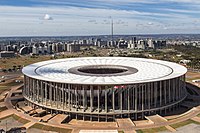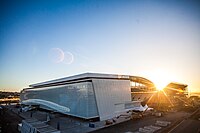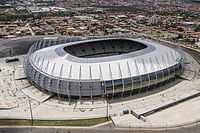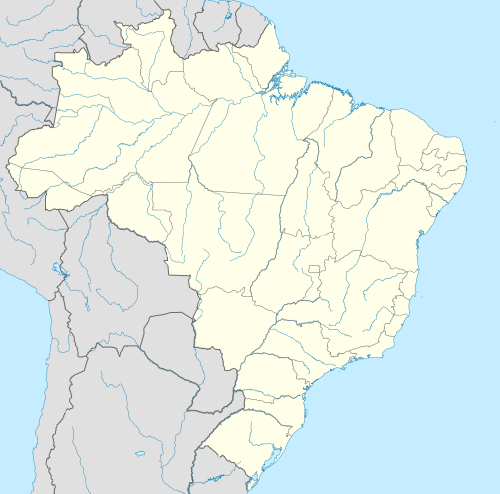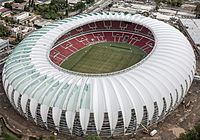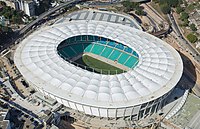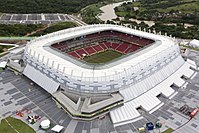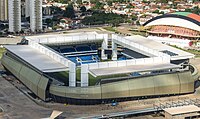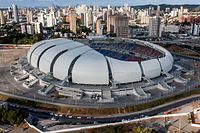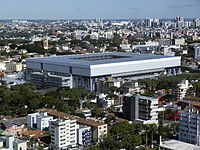2014 FIFA World Cup
The 2014 FIFA World Cup article documents a current sports event (12 June – 13 July 2014). Content in the article may change rapidly as the tournament progresses. The current round is the group stage (12 June – 26 June) and results can be seen at the respective groups: |
| Copa do Mundo da FIFA Brasil 2014[nb 1] | |
|---|---|
 2014 FIFA World Cup logo | |
| Tournament details | |
| Host country | Brazil |
| Dates | 12 June – 13 July 2014 |
| Teams | 32 (from 5 confederations) |
| Venue(s) | 12 (in 12 host cities) |
| Tournament statistics | |
| Matches played | 17 |
| Goals scored | 49 (2.88 per match) |
| Attendance | 856,455 (50,380 per match) |
| Top scorer(s) | (3 goals) |
The 2014 FIFA World Cup is the 20th FIFA World Cup, a tournament for the men's football world championship, that is currently taking place in Brazil.
It began on 12 June, with a group stage, and is scheduled to conclude on 13 July with the final.[1] It is the second time that Brazil has hosted the competition, the first being in 1950. Brazil was elected unchallenged as host nation in 2007 after the international football federation, FIFA, decreed that the tournament would be staged in South America for the first time since 1978 in Argentina, and the fifth time overall.
The national teams of 31 countries advanced through qualification competitions that began in June 2011 to participate with the host nation Brazil in the final tournament. A total of 64 matches are being played in 12 cities across Brazil in either new or redeveloped stadiums. For the first time at a World Cup finals, match officials are using goal-line technology, as well as vanishing foam for free kicks.[2]
With the host country, all world champion teams since the first World Cup in 1930: Argentina, England, France, Germany (who won three times as West Germany), Italy, Spain and Uruguay, have qualified for this competition. Spain is the defending champion, having defeated the Netherlands 1–0 in the 2010 final to win its first World Cup. All previous four World Cup tournaments staged in South America were won by South American teams.[3]
Host selection
In March 2003, FIFA announced that the tournament would be held in South America for the first time since 1978, in line with its then-active policy of rotating the right to host the World Cup among different confederations.[4][5] The decision meant that it would be the first time that two consecutive World Cups were staged outside Europe. Only Brazil and Colombia formally declared their candidacy but, after the withdrawal of the latter from the process,[6] Brazil was officially elected as host nation unopposed on 30 October 2007.[7]
Participating teams and officials
Qualification
Following qualification matches between June 2011 and November 2013, the following 32 teams – shown with their final pre-tournament FIFA World Rankings[8] – qualified for the final tournament. This marks the return of Ecauador, Costa Rica and Iran after they missed the 2010 edition. Colombia qualified for the World Cup after 16 years of absence. Bosnia and Herzegovina is the only team with no previous World Cup Finals experience.[9][nb 2] Only three top-25 ranked teams did not qualify for the tournament: Ukraine (16), Denmark (23) and Slovenia (25).[8]
Paraguay failed to qualify for the finals for the first time since 1994. Further 6 teams, who participated at the 2010 FIFA World Cup, also failed to qualify: South Africa, North Korea, Slovakia, Slovenia, Serbia, Denmark and New Zealand. It is also the first time since 2002 that no OFC team will be among the finalists as New Zealand were eliminated by Mexico in the OFC-CONCACAF play-off.[nb 3][citation needed]
|
|
|
|
Final draw
The 32 participating teams were to be drawn into the eight groups of the group stage. In preparation for this, the teams were organised into four pots with the seven highest-ranked teams joining host nation Brazil in the seeded pot.[10] As with the previous tournaments, FIFA aimed to create groups which maximised geographic separation and therefore the unseeded teams were arranged into pots based on geographic considerations.[11][12] The draw took place on 6 December 2013 at the Costa do Sauipe resort in Bahia, during which the teams were drawn by various past World Cup-winning players.[13][14] Under the draw procedure, one randomly drawn team was firstly relocated from Pot 4 to Pot 2 to create four equal pots of eight teams.[11]
Squads
As with the 2010 tournament, each team's squad consists of 23 players (three of whom must be goalkeepers). Each participating national association had to confirm their final 23-player squad no later than 10 days before the start of the tournament.[15] Teams were permitted to make late replacements in the event of serious injury, at any time up to 24 hours before their first game.[15] During a match, all remaining squad members not named in the starting team are available to be one of the three permitted substitutions (provided the player is not serving a suspension).[15]
Officials
In March 2013, FIFA published a list of 52 prospective referees, each paired with two assistant referees, from all six football confederations for the tournament. On 14 January 2014, the FIFA Referees Committee appointed 25 referee trios and eight support duos representing 43 different countries for the tournament.[16][17]
Venues
Twelve venues (seven new and five renovated) in twelve cities have been selected for the tournament. The venues cover all the main regions of Brazil and create more evenly distributed hosting than the 1950 finals in Brazil.[18] Consequently, the tournament will require long-distance travel for teams.[19] During the World Cup, Brazilian cities will also be home to the participating teams at 32 separate base camps,[20] as well as staging official fan fests where supporters can view the games.[21]
Team base camps
The base camps are used by 32 national squads to stay and train before and during the World Cup tournament. On 31 January 2014, FIFA announced the base camps for each participating team,[20] having earlier circulated a brochure of 84 prospective locations.[22] Only five teams have opted to stay in the northern region of Brazil.[23]
FIFA Fan Fests
For a third consecutive World Cup tournament, FIFA are staging FIFA Fan Fests in each of the twelve host cities throughout the competition. Prominent examples are the Copacabana Beach in Rio de Janeiro, which already held a Fan Fest in 2010, São Paulo's Vale do Anhangabaú and Brasília's Esplanada dos Ministérios, with the Congress in the background.[24][25] The first official event took place on Iracema Beach, in Fortaleza, on 8 June 2014.[26]
Innovations
Technologies
New technologies that are being introduced to World Cup football for the first time include goal-line technology, vanishing foam, and improved football production technology.
For the first time at a World Cup Finals, the officials are being assisted by goal-line technology. The previous World Cup was a catalyst for the decision to adopt technology after England were denied a goal in their round of 16 match against Germany.[27] Following the mistake in this game, FIFA President Sepp Blatter said "it would be a nonsense not to reopen the file on goal-line technology"[28] and in 2012 the IFAB approved its usage.[29] This is the fourth FIFA competition to use the technology after successful trials at 2012 Club World Cup, 2013 Club World Cup and 2013 Confederations Cup. The German company GoalControl was selected as the tournament's official goal-line technology provider in October 2013.[30]
Following successful trials,[nb 4] FIFA approved the use of vanishing foam by the referees for the first time at a World Cup Finals. The water-based spray, which disappears within minutes of application, can be used to mark a ten-yard line for the defending team during a free kick and also to draw where the ball is to be placed for a free kick.[31]
The Brazuca is the official match ball of the 2014 FIFA World Cup.[32][33][34] It is made by the company Adidas, a FIFA Partner and FIFA World Cup Official Match Ball supplier since 1970.[32][33][34] Adidas created a new design of ball after criticisms of the Adidas Jabulani used in the previous World Cup. The number of panels was reduced to six, with the panels being thermally bonded. This created a ball with increased consistency and aerodynamics compared to its predecessor. Furthermore Adidas underwent an extensive testing process lasting more than two years to produce a ball that would meet the approval of football professionals. The Brazuca was manufactured by Forward Sports of Sialkot, Pakistan, for Adidas.[35][36]
Anti-doping
In 2014, the biological passport is introduced in the FIFA World Cup; blood and urine samples from all players before the competition and from two players per team and per match are analysed by the Swiss Laboratory for Doping Analyses.[37]
Format

The first round, or group stage, is a round-robin competition between the 32 teams divided among eight groups of four. The two best teams in each group will progress to the knockout stage.[15]
The ranking of teams in each group is based on:
- Points in all group matches, with 3 points awarded for a win, one point for a draw and none for a loss.
- Goal difference in all group matches
- Goals scored in all group matches
- Points in matches between tied teams
- Goal difference in matches between tied teams
- Goals scored in matches between tied teams
- Drawing of lots
In the knockout stage there will be four rounds (round of 16, quarter-finals, semi-finals, and the final), with each eliminating the losers. The two semi-final losers will compete in a third place play-off. A draw in the knockout stages will be followed by two 15 minute periods of extra time to determine a winner. If the teams are still tied, a penalty shoot-out will be held.[15]
The match schedule was announced on 20 October 2011[38] with the kick-off times being confirmed on 27 September 2012;[39] after the final draw, the kick-off times of seven matches were adjusted by FIFA.[40] The competition is organised so that teams that played each other in the group stage cannot meet again during the knockout phase until the final (or the 3rd place match).[citation needed]
Group stage
The group stage began on 12 June, with the host nation competing in the opening game as has been the format since the 2006 tournament. The opening game was preceded by an opening ceremony that began at 15:15 local time.[41]
All times listed below are in Brasília official time (UTC−3).[nb 5]
| Key to colours in group tables | |
|---|---|
| Teams that advanced to the round of 16 | |
Group A
Template:2014 FIFA World Cup Group A table
Group B
Template:2014 FIFA World Cup Group B table
| Spain | 1–5 | |
|---|---|---|
| Alonso |
Report | Van Persie Robben De Vrij |
| Australia | Match 20 | |
|---|---|---|
| Report |
Group C
Template:2014 FIFA World Cup Group C table
| Japan | Match 22 | |
|---|---|---|
| Report |
Group D
Template:2014 FIFA World Cup Group D table
Group E
Template:2014 FIFA World Cup Group E table
| Switzerland | 2–1 | |
|---|---|---|
| Mehmedi Seferović |
Report | E. Valencia |
Group F
Template:2014 FIFA World Cup Group F table
Group G
Template:2014 FIFA World Cup Group G table
Group H
Template:2014 FIFA World Cup Group H table
| Russia | 1–1 | |
|---|---|---|
| Kerzhakov |
Report | Lee Keun-ho |
Knockout stage
Template:2014 FIFA World Cup knockout bracket
Round of 16
| Winner Group A | Match 49 | Runner-up Group B |
|---|---|---|
| Winner Group C | Match 50 | Runner-up Group D |
|---|---|---|
| Winner Group B | Match 51 | Runner-up Group A |
|---|---|---|
| Winner Group D | Match 52 | Runner-up Group C |
|---|---|---|
| Winner Group E | Match 53 | Runner-up Group F |
|---|---|---|
| Winner Group G | Match 54 | Runner-up Group H |
|---|---|---|
| Winner Group F | Match 55 | Runner-up Group E |
|---|---|---|
| Winner Group H | Match 56 | Runner-up Group G |
|---|---|---|
Quarter-finals
| Winner Match 53 | Match 58 | Winner Match 54 |
|---|---|---|
| Winner Match 49 | Match 57 | Winner Match 50 |
|---|---|---|
| Winner Match 55 | Match 60 | Winner Match 56 |
|---|---|---|
| Winner Match 51 | Match 59 | Winner Match 52 |
|---|---|---|
Semi-finals
| Winner Match 57 | Match 61 | Winner Match 58 |
|---|---|---|
| Winner Match 59 | Match 62 | Winner Match 60 |
|---|---|---|
Third place match
| Loser Match 61 | Match 63 | Loser Match 62 |
|---|---|---|
Final
| Winner Match 61 | Match 64 | Winner Match 62 |
|---|---|---|
Prize money
The total prize money on offer for the tournament was confirmed by FIFA as US$576 million (including payments of US$70 million to domestic clubs), a 37 percent increase from the amount allocated in the 2010 tournament.[45] Before the tournament, each of the 32 entrants will receive US$1.5 million for preparation costs. Once at the tournament, the prize money will be distributed as follows:
- US$8 million – To each team eliminated at the group stage (16 teams)
- US$9 million – To each team eliminated in the round of 16 (8 teams)
- US$14 million – To each team eliminated in the quarter-finals (4 teams)
- US$20 million – Fourth placed team
- US$22 million – Third placed team
- US$25 million – Runner-up
- US$35 million – Winner
Statistics
Goalscorers
Template:2014 FIFA World Cup Goalscorers
Discipline
The following players are currently serving suspensions:
| Player | Team | Offence | Suspension |
|---|---|---|---|
| Wilson Palacios | Second yellow card; vs France (15 June) | One match; vs Ecuador (20 June)[46] | |
| Pepe | Straight red card; vs Germany (16 June) | One match; vs United States (22 June)[46] | |
| Maxi Pereira | Straight red card; vs Costa Rica (14 June) | One match; vs England (19 June)[46] |
Preparations and costs
Forecasts on the eve of the tournament estimate the cost to the Brazilian government will be $14 billion, making it the most expensive World Cup to date.[47] FIFA is expected to spend $2 billion on staging the finals,[48] with its greatest single expense being the $576 million prize money pot.[45]
Although organisers originally estimated costs of US$1.1 billion,[49] a reported US$3.6 billion has ultimately been spent on stadium works.[50][51] Five of the chosen host cities have brand new venues built specifically for the World Cup, while the Estádio Nacional Mané Garrincha in the capital Brasília was demolished and rebuilt, with the remaining six being extensively renovated.[52]
An additional R$3 billion (US$1.3 billion, €960 million, £780 million at June 2014 rates) has been earmarked by the Brazilian government for investment in infrastructure works and projects for use during the 2014 World Cup and beyond.[53] However, the failed completion of many of the proposed works has provoked discontent among some Brazilians.[54][55][56]
The Brazilian government has pledged $900 million will be invested into security forces and that the tournament will be "one of the most protected sports events in history".[57]
Marketing
The marketing of the 2014 FIFA World Cup includes sale of tickets, support from sponsors and promotion through events that utilize the symbols and songs of the tournament. Popular merchandise includes items featuring the official mascot as well as an official video game that has been developed by EA Sports.[58]
Media
For a fourth consecutive FIFA World Cup Finals, the coverage is being provided by HBS (Host Broadcast Services), a subsidiary of Infront Sports & Media.[59] Sony has been selected as the official equipment provider and has built 12 bespoke high definition production 40-foot-long containers, one for each tournament venue, to house the extensive amount of equipment required.[60][61] Each match utilises 37 standard camera plans, including Aerial and Cablecam, two Ultramotion cameras and dedicated cameras for interviews.[61] The official tournament film, as well as three matches,[nb 6] will be filmed with ultra high definition technology (4K resolution), following a successful trial at the 2013 FIFA Confederations Cup.[62]
The broadcasting rights – covering television, radio, internet and mobile coverage – for the tournament have been sold to media companies in each individual territory either directly by FIFA, or through licensed companies or organisations such as the European Broadcasting Union, Organización de Televisión Iberoamericana, International Media Content, Dentsu and RS International Broadcasting & Sports Management.[63] The sale of these rights accounts for an estimated 60% of FIFA's income from staging a World Cup.[64] The International Broadcast Centre is situated at the Riocentro in the Barra da Tijuca neighbourhood of Rio de Janeiro.[65][66]
Controversies
Protests
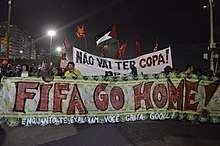
Prior to the opening ceremony of the 2013 FIFA Confederations Cup staged in Brazil, demonstrations took place outside the venue, organised by people unhappy with the amount of public money spent to enable the hosting of the FIFA World Cup.[67] Both the Brazilian president Dilma Rousseff and FIFA president Sepp Blatter were heavily booed as they were announced to give their speeches at the 2013 tournament's opening,[68] which resulted in FIFA announcing that the 2014 FIFA World Cup opening ceremony would not feature any speeches.[69] Further protests took place outside other matches during the Confederations Cup[70][71] as part of wider unrest and rioting in Brazilian cities, seeking to express disenchantment with the government's financial management of the country.[67][72]
Former Brazilian footballer and now political figure Romário has labelled the tournament "the biggest theft in history", saying that he believes its real cost will exceed R$100 billion (US$46 billion). He has called for a deeper investigation into the widespread misuse of public funds, which he identifies as the reason for the continuing protests.[73][74][75][76][77]
The weeks preceding the 2014 World Cup as well as the first days of the tournament have featured further unrest and protests across the country against the spending.[78][79][80] However, in contrast to the Confederations Cup, security forces have managed to prevent any protests reaching the stadiums.[81]
Directly before the tournament, President Rousseff reiterated her assurances of the previous year that all the implemented public works had long-term benefits for Brazilians.[82][83]
Budweiser bill
After numerous deaths in football stadiums, Brazil passed a law in 2003 outlawing alcohol sales in stadiums. FIFA demanded that Brazil allow alcohol sales at the World Cup because Budweiser, a major World Cup sponsor is the "Official Beer of the FIFA World Cup", a role it has played since 1986. In response, Brazil passed a law paving the way for alcohol sales in the World Cup, nicknamed the "Budweiser Bill".[84][85]
Refereeing
In the opening match between host team Brazil and Croatia in Group A, the officials were criticised for a number of decisions in favour of the Brazilians. In the 71st minute, defender Dejan Lovren put his hands below Fred's arms in the Croatian penalty area, after which Fred fell down. Japanese referee Yuichi Nishimura decided to award Brazil a penalty kick which Neymar subsequently converted on for what turned out to be the game-winning goal for Brazil. The call was condemned by various people, including former World Cup referees,[86] Japanese fans,[87] players from other teams and newspaper writers,[88][88][89][90] arguing that Lovren's contact was minimal and that Fred went down on his own. Massimo Busacca, Head of Refereeing Development at FIFA, defended Nishimura's decision and stated that Lovren's contact was significant enough, but admitted that there are doubts as to whether Nishimura will be appointed to other games in the tournament.[91] 12 minutes later, the Croatians had an equaliser disallowed for a foul by Ivica Olić as Brazilian goalkeeper Júlio César went down in a high-ball duel, another call that was also condemned by various sources.[92][93][94] Renowned former top-level FIFA referee Markus Merk questioned FIFA's appointment of Nishimura as the referee in the opening match, labelling the refereeing in the match as "embarrassing".[95]
In the Group A game between Mexico and Cameroon, Mexican midfielder Giovani dos Santos had two goals wrongly disallowed for offside in the first half. Replays showed that he was in line with the last defender for the first, whilst the ball came from a Cameroonian player for the second.[96] Following the game, which Mexico won 1–0, Amy Lawrence of The Guardian described the tournament as having "incompetent officiating", and called for FIFA president Sepp Blatter to allow team managers to challenge two decisions per match with video review, a possibility that Blatter discussed before the tournament.[97][98]
Notes
- ^ The Brazilian Portuguese pronunciation is [ˈkɔpɐ du ˈmũdu dɐ ˈfifɐ bɾɐˈziw ˈdojz ˈmiw i kɐˈtoʁzi], in Brazil's standard pronunciation.
- ^ Bosnia & Herzegovina was until 1992 part of Yugoslavia, which competed at eight World Cup tournaments
- ^ Australia was OFC member at the time of the OFC 2006 FIFA World Cup Qualifiers. They joined AFC on 1 January 2006.
- ^ The spray was trialled at the 2013 FIFA U-20 World Cup, 2013 FIFA U-17 World Cup and 2013 FIFA Club World Cup
- ^ This is the time zone of 10 of the 12 venues; the other two, Cuiabá and Manaus, are in the Amazon time zone (UTC−4), therefore for matches hosted at these two venues the local kickoff times are one hour earlier than the times listed below.[42]
- ^ Those matches scheduled to be filmed in ultra high definition are one match from the round of 16 (on 28 June), one quarter-final (on 4 July) and the final
References
- ^ "Pot allocations for the Preliminary Draw". FIFA.com (Fédération Internationale de Football Association). 27 July 2011. Retrieved 27 July 2011.
- ^ "FIFA launch GLT tender for Brazil 2013/14". FIFA.com (Fédération Internationale de Football Association). 19 February 2013.
- ^ "If the World Cup started tomorrow". ESPN. 12 June 2013.
- ^ "2014 FIFA World Cup to be held in South America". FIFA. 7 March 2003.
- ^ "Rotation ends in 2018". FIFA.com (Fédération Internationale de Football Association). 29 October 2007.
- ^ "Brazil confirms bid - Colombia withdraws". FIFA.com (Fédération Internationale de Football Association). 13 April 2007.
- ^ "Brazil confirmed as 2014 hosts". FIFA.com (Fédération Internationale de Football Association). 30 October 2007.
- ^ a b "FIFA/Coca-Cola Rankings". FIFA.com (Fédération Internationale de Football Association). 5 June 2014. Retrieved 11 June 2014.
- ^ "1 day to go". FIFA.com (Fédération Internationale de Football Association). 11 June 2014.
- ^ "Pot 1 seeds set for Brazil 2014 draws". FIFA.com (Fédération Internationale de Football Association). 17 October 2013. Retrieved 23 November 2013.
- ^ a b "Draw procedures approved". FIFA.com (Fédération Internationale de Football Association). 3 December 2013. Retrieved 3 December 2013.
- ^ "Final draw procedures" (PDF). FIFA.com (Fédération Internationale de Football Association). 3 December 2013. Retrieved 3 December 2013.
- ^ "Final Draw reveals intriguing groups". FIFA.com (Fédération Internationale de Football Association). 6 December 2013.
- ^ "A team of stars for the draw". FIFA.com (Fédération Internationale de Football Association). 5 December 2013.
- ^ a b c d e "Regulations – FIFA World Cup Brazil 2014" (PDF). FIFA.com (Fédération Internationale de Football Association).
- ^ "Referee trios and support duos appointed for 2014 FIFA World Cup". FIFA.com (Fédération Internationale de Football Association). 15 January 2014.
- ^ "Referees & assistant referees for the 2014 FIFA World Cup" (PDF). FIFA.com (Fédération Internationale de Football Association).
- ^ "Host cities in 1950 FIFA World Cup". Colunas.globoesporte.com. Retrieved 9 October 2011.
- ^ "2014 FIFA World Cup: Luck of the draw 'an essential component'". BBC Sport (British Broadcasting Corporation). 2 December 2013.
- ^ a b "Team Base Camps for Brazil 2014 announced". FIFA.com (Fédération Internationale de Football Association). 21 January 2014.
- ^ "FIFA Fan Fest locations confirmed". FIFA.com (Fédération Internationale de Football Association). 20 January 2014.
- ^ "Team Base Camps Brochure" (PDF). FIFA.com (Fédération Internationale de Football Association). 7 November 2013.
- ^ "Most teams pick bases in south east Brazil". BBC Sport (British Broadcasting Corporation). 1 February 2014.
- ^ "World Cup 2014 FanCamps and FanFests". Retrieved 8 August 2012.
- ^ "FIFA Fan Fest locations confirmed". Retrieved 20 January 2014.
- ^ "Ronaldo kicks off FIFA Fan Fest". 9 June 2014.
- ^ "England v Germany: Frank Lampard denied goal by Uruguayan linesman – in pictures". The Daily Telegraph. 27 June 2010.
- ^ "World Cup 2010: Blatter apologises for disallowed goal". BBC Sport (British Broadcasting Corporation). 29 June 2010.
- ^ "IFAB gives the green light to goal-line technology". FIFA.com (Fédération Internationale de Football Association). 5 July 2012. Archived from the original on 11 July 2012.
- ^ "GoalControl confirmed as goal-line technology provider for Brazil 2014". FIFA.com (Fédération Internationale de Football Association). 10 October 2013.
- ^ "Vanishing spray set for World Cup". eurosport.com. 21 November 2013.
- ^ a b "adidas Brazuca – Name of Official Match Ball decided by Brazilian fans". FIFA.com. Fédération Internationale de Football Association. Retrieved 3 September 2012.
- ^ a b "Brazuca – an icon is born". Adidas. Adidas Group. Retrieved 14 June 2014.
- ^ a b "adidas brings brazuca into the world". FIFA.com. Fédération Internationale de Football Association. 3 December 2013. Retrieved 4 December 2013.
- ^ Zhang Jingya. "World Cup ball: Pakistan launches the "Brazuca" - CCTV News - CCTV.com English". Retrieved 12 June 2014.
- ^ By AFP. "Football: Sialkot workers fire 'Brazuca' ball to Brazil – The Express Tribune". Tribune.com.pk. Retrieved 12 June 2014.
- ^ Template:Fr Anti-dopage. Dvorak : "Le profil biologique, une approche complètement nouvelle", fifa.com (page visited on 11 June 2014).
- ^ "Match schedule for 2014 FIFA World Cup unveiled". FIFA.com (Fédération Internationale de Football Association). 20 October 2011.
- ^ "FIFA Executive Committee approves kick-off times for Brazil 2014". FIFA.com (Fédération Internationale de Football Association). 27 September 2012.
- ^ "Match schedule for Brazil 2014 confirmed". FIFA.com (Fédération Internationale de Football Association). 7 December 2013.
- ^ "Brazil 2014: Opening ceremony". FIFA.com (Fédération Internationale de Football Association). 12 June 2014.
- ^ "MATCH SCHEDULE – 2014 FIFA World Cup Brazil" (PDF). FIFA.com (Fédération Internationale de Football Association).
- ^ "Match report – Brazil–Croatia" (PDF). FIFA.com. 12 June 2014. Retrieved 13 June 2014.
- ^ "Referee designations for matches 1-4" (PDF). fifa.com. 10 June 2014.
- ^ a b "World Cup money pot increased to $576m". reuters.com. Retrieved 25 April 2014.
- ^ a b c "Palacios et Pereira suspendus un match" (in French). FIFA.com (Fédération Internationale de Football Association). 16 June 2014.
- ^ "World Cup set to be most lucrative ever". ESPN. 23 May 2014.
- ^ "Record World Cup numbers game for FIFA, Brazil". USA Today. 22 May 2014.
- ^ "FIFA's Inspection Report" (PDF). Retrieved 9 October 2011.
- ^ "Corruption to blame for some Brazil World Cup cost rises". Bloomberg. 23 May 2014.
- ^ "Brazil World Cup stadiums on track, but costs soar". Reuters. 3 April 2012.
- ^ "2014 Fifa World Cup: Where are the 12 host stadiums in Brazil?". BBC Sport (British Broadcasting Corporation). 3 December 2013.
- ^ "FIFA World Cup 2014 host cities to receive US$ 1.5 billion". Brazil-Arab News Agency. 22 July 2009.
- ^ "Less than half of Brazilians favor hosting World Cup, poll shows". Reuters. 8 April 2014.
- ^ "The social cost of Brazil hosting World Cup 2014". Bleacher Report. 6 June 2013.
- ^ "Fifa concern about three Brazil stadiums". BBC Sport (British Broadcasting Corporation). 30 May 2014.
- ^ "Brazil boosts World Cup security budget as crime rises". CNN. 5 December 2013.
- ^ "EA Announces EA SPORTS 2014 FIFA World Cup Brazil". IGN. 6 February 2014. Retrieved 24 February 2014.
- ^ "Host Broadcasting". FIFA.com (Fédération Internationale de Football Association). Retrieved 4 December 2013.
- ^ "Sony Professional awarded 2014 FIFA World Cup Broadcast Production Contract". Live-production.tv. 13 September 2012.
- ^ a b "Sony's astonishing World Cup statistics". RedShark News. 22 May 2014.
- ^ "Sony and FIFA announce further 4K coverage of the 2014 FIFA World Cup". FIFA.com (Fédération Internationale de Football Association). 3 April 2014.
- ^ "2014 FIFA World Cup BrazilTM Media Rights Licensees" (PDF). FIFA.com (Fédération Internationale de Football Association). 7 November 2013.
- ^ "FIFA revenue estimated to be 4 billion dollars at the close of the 2014 World Cup". CONMEBOL.com. 17 May 2013.
- ^ "International Broadcast Centre to be hosted in Rio de Janeiro". FIFA.com (Fédération Internationale de Football Association). 27 May 2011.
- ^ "Nerve centre for World Cup TV production opens in Rio". FIFA.com (Fédération Internationale de Football Association). 2 June 2014.
- ^ a b Reuters (15 June 2013). "Brazil Beats Japan, Protests Spoil Confederations Cup Opening Day". Voice of America. Brasilia: Federal government of the United States. Retrieved 16 June 2013.
{{cite web}}:|author=has generic name (help) - ^ Peck, Brooks (29 May 2013). "Sepp Blatter, Brazil president Dilma booed at Confederations Cup opening ceremony". Sports.yahoo.com. Retrieved 16 June 2013.
- ^ "Fifa scraps speeches to avoid protest". BBC Sport (British Broadcasting Corporation). 12 March 2014.
- ^ "Confed Cup protests continue". ESPN. 17 June 2013.
- ^ "Police clashes at start of Brazil Confederations Cup final". BBC Sport (British Broadcasting Corporation). 1 July 2013.
- ^ "Brazil despair: Protests over transport, inflation gain intl support (PHOTOS) — RT News". Rt.com. Retrieved 18 June 2013.
- ^ "Romário diz que Copa de 2014 será o 'maior roubo da história'". 13 June 2014.
- ^ "Copa será o maior roubo da história". 13 June 2014.
- ^ ""Copa do Mundo vai custar R$ 100 bilhões para o Brasil", diz Romário". 13 June 2014.
- ^ "Romário diz ao R7 que Brasil vai gastar R$ 100 bilhões na Copa". 13 June 2014.
- ^ "Romário volta a criticar organização da Copa: "o Brasil perdeu de goleada"". 13 June 2014.
- ^ "Strikes, violent protests hit Brazil ahead of World Cup". CNN. 16 May 2014.
- ^ "17 Pictures Of Shocking Violence As Police 'Open Live Fire' On Anti-Fifa Protesters". Huffington Post. 16 June 2014.
- ^ "Brazilian police fire tear gas at World Cup protesters; CNN employees injured by anti-riot weapons". CNN. 12 June 2014.
- ^ "Has Brazil proved World Cup doubters wrong?". BBC. 16 June 2014.
- ^ "Brazil president Rousseff defends public spending on World Cup as protests continue". Daily Mail. 22 June 2013.
- ^ "Rousseff defends Brazil's World Cup spending, urges warm welcome". Reuters. 11 June 2014.
- ^ Brazil Moves To Ease Soccer Beer Ban, As World Cup Spat With FIFA Grows, NPR (March 07, 2012).
- ^ Brazilian Senate approves ‘Budweiser bill’ ending dispute with FIFA over World Cup sponsoring, Merco Press, (May 10, 2012).
- ^ Voakes, Kris (13 June 2014). "Remy: Brazil's Fred Should Be Punished for Penalty". Goal.com. Retrieved 16 June 2014.
- ^ "Japanese fans express regret over Nishimura's call". Associated Press. 13 June 2014. Retrieved 13 June 2014.
- ^ a b Pugmire, Jerome (13 June 2014). "Remy: Brazil's Fred Should Be Punished for Penalty". ABC News. Associated Press. Retrieved 16 June 2014. Cite error: The named reference "AP Remy" was defined multiple times with different content (see the help page).
- ^ Samuel, Martin (12 June 2014). "Brazil 3-1 Croatia: Neymar scores twice (and escapes a sending off) as Oscar stunner rounds off opening win for hosts". Daily Mail. Retrieved 16 June 2014.
- ^ Paulo, Sao (13 June 2014). "Kelly: A referee undone by the pressure in Brazil". The Globe and Mail. Retrieved 16 June 2014.
- ^ De Menezes, Jack (13 June 2014). "Brazil 3 Croatia 1: Fifa defend under-fire referee Yuichi Nishimura as Japanese official caught up in diving row during opening World Cup match". The Independent. Retrieved 16 June 2014.
- ^ Glendenning, Barry (12 June 2014). "Brazil 3-1 Croatia: World Cup 2014 – as it happened". The Guardian. Retrieved 16 June 2014.
- ^ Kane, Desmond (12 June 2014). "Forget Neymar, Brazil's new national hero is Yuichi Nishimura". Eurosport. Retrieved 16 June 2014.
- ^ "Brazil 3 - 1 Croatia Match report - Goal.com". Goal.com. 12 June 2014. Retrieved 16 June 2014.
- ^ Haji Talib, Hassan; Chotpibulsap, Pitisak (13 June 2014). "Former FIFA referee: Refereeing for World Cup opener was "embarrassing"". Goal.com. Retrieved 16 June 2014.
- ^ Duncan, Hannah (13 June 2014). "World Cup 2014: Mexico's Giovani Dos Santos has TWO goals WRONGLY ruled out for offside in first-half against Cameroon". Metro. Retrieved 16 June 2014.
- ^ Lawrence, Amy (13 June 2014). "Mexico's disallowed goals add to World Cup's incompetent officiating". The Guardian. Retrieved 16 June 2014.
- ^ Gibson, Owen (11 June 2014). "Sepp Blatter does U-turn over allowing video challenges in live play". The Guardian. Retrieved 16 June 2014.



